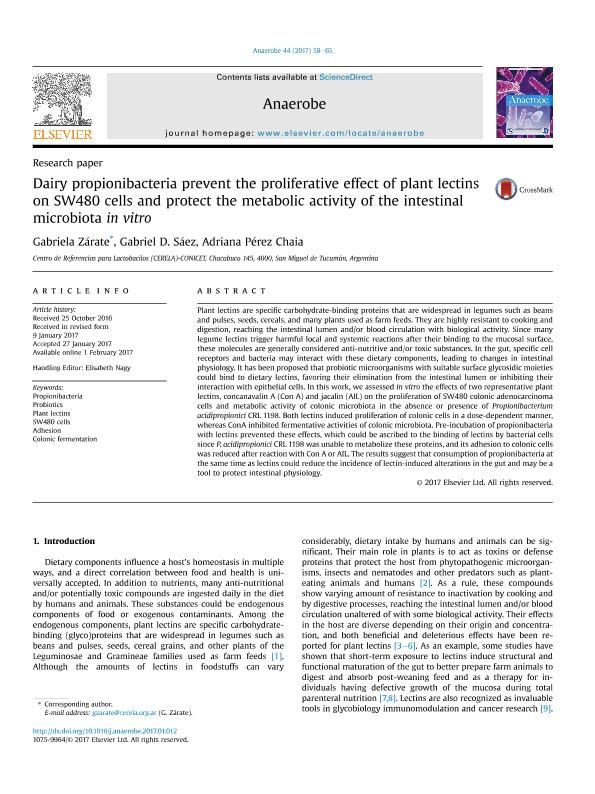Mostrar el registro sencillo del ítem
dc.contributor.author
Zarate, Gabriela del Valle

dc.contributor.author
Saez, Gabriel Dario

dc.contributor.author
Perez Chaia, Adriana Beatriz

dc.date.available
2018-06-26T15:14:38Z
dc.date.issued
2017-04
dc.identifier.citation
Zarate, Gabriela del Valle; Saez, Gabriel Dario; Perez Chaia, Adriana Beatriz; Dairy propionibacteria prevent the proliferative effect of plant lectins on SW480 cells and protect the metabolic activity of the intestinal microbiota in vitro; Elsevier; Anaerobe; 44; 4-2017; 58-65
dc.identifier.issn
1075-9964
dc.identifier.uri
http://hdl.handle.net/11336/50055
dc.description.abstract
Plant lectins are specific carbohydrate-binding proteins that are widespread in legumes such as beans and pulses, seeds, cereals, and many plants used as farm feeds. They are highly resistant to cooking and digestion, reaching the intestinal lumen and/or blood circulation with biological activity. Since many legume lectins trigger harmful local and systemic reactions after their binding to the mucosal surface, these molecules are generally considered anti-nutritive and/or toxic substances. In the gut, specific cell receptors and bacteria may interact with these dietary components, leading to changes in intestinal physiology. It has been proposed that probiotic microorganisms with suitable surface glycosidic moieties could bind to dietary lectins, favoring their elimination from the intestinal lumen or inhibiting their interaction with epithelial cells. In this work, we assessed in vitro the effects of two representative plant lectins, concanavalin A (Con A) and jacalin (AIL) on the proliferation of SW480 colonic adenocarcinoma cells and metabolic activity of colonic microbiota in the absence or presence of Propionibacterium acidipropionici CRL 1198. Both lectins induced proliferation of colonic cells in a dose-dependent manner, whereas ConA inhibited fermentative activities of colonic microbiota. Pre-incubation of propionibacteria with lectins prevented these effects, which could be ascribed to the binding of lectins by bacterial cells since P. acidipropionici CRL 1198 was unable to metabolize these proteins, and its adhesion to colonic cells was reduced after reaction with Con A or AIL. The results suggest that consumption of propionibacteria at the same time as lectins could reduce the incidence of lectin-induced alterations in the gut and may be a tool to protect intestinal physiology.
dc.format
application/pdf
dc.language.iso
eng
dc.publisher
Elsevier

dc.rights
info:eu-repo/semantics/openAccess
dc.rights.uri
https://creativecommons.org/licenses/by-nc-sa/2.5/ar/
dc.subject
Adhesion
dc.subject
Colonic Fermentation
dc.subject
Plant Lectins
dc.subject
Probiotics
dc.subject
Propionibacteria
dc.subject
Sw480&Nbsp;Cells
dc.subject.classification
Otras Ciencias Biológicas

dc.subject.classification
Ciencias Biológicas

dc.subject.classification
CIENCIAS NATURALES Y EXACTAS

dc.title
Dairy propionibacteria prevent the proliferative effect of plant lectins on SW480 cells and protect the metabolic activity of the intestinal microbiota in vitro
dc.type
info:eu-repo/semantics/article
dc.type
info:ar-repo/semantics/artículo
dc.type
info:eu-repo/semantics/publishedVersion
dc.date.updated
2018-05-08T19:34:36Z
dc.journal.volume
44
dc.journal.pagination
58-65
dc.journal.pais
Países Bajos

dc.journal.ciudad
Amsterdam
dc.description.fil
Fil: Zarate, Gabriela del Valle. Consejo Nacional de Investigaciones Científicas y Técnicas. Centro Científico Tecnológico Conicet - Tucumán. Centro de Referencia para Lactobacilos; Argentina
dc.description.fil
Fil: Saez, Gabriel Dario. Consejo Nacional de Investigaciones Científicas y Técnicas. Centro Científico Tecnológico Conicet - Tucumán. Centro de Referencia para Lactobacilos; Argentina
dc.description.fil
Fil: Perez Chaia, Adriana Beatriz. Consejo Nacional de Investigaciones Científicas y Técnicas. Centro Científico Tecnológico Conicet - Tucumán. Centro de Referencia para Lactobacilos; Argentina
dc.journal.title
Anaerobe

dc.relation.alternativeid
info:eu-repo/semantics/altIdentifier/doi/https://dx.doi.org/10.1016/j.anaerobe.2017.01.012
dc.relation.alternativeid
info:eu-repo/semantics/altIdentifier/url/https://www.sciencedirect.com/science/article/pii/S1075996417300203
Archivos asociados
